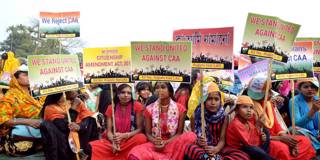For three decades, India's self-branding as the world’s fastest-growing free-market democracy worked, with world leaders queuing up to visit New Delhi and burdening a generation of diplomatic protocol officers. But in a matter of months, it has all begun to fall apart.
NEW DELHI – After India launched far-reaching economic reforms in 1991, its stature in the world rose steadily. The country was already recognized as a thriving democracy and an example to the world of how to manage diversity in a free and open society. Its enhanced economic clout and the size of its increasingly prosperous market added to its appeal. Its self-branding as the world’s fastest-growing free-market democracy worked; world leaders queuing up to visit New Delhi became a burden for a generation of diplomatic protocol officers.

NEW DELHI – After India launched far-reaching economic reforms in 1991, its stature in the world rose steadily. The country was already recognized as a thriving democracy and an example to the world of how to manage diversity in a free and open society. Its enhanced economic clout and the size of its increasingly prosperous market added to its appeal. Its self-branding as the world’s fastest-growing free-market democracy worked; world leaders queuing up to visit New Delhi became a burden for a generation of diplomatic protocol officers.